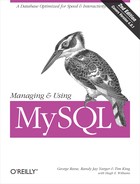Include Files
Example 11-3
shows the db.inc
file that is included in each of the gift registry scripts. The
include directive allows the variables and
functions in db.inc to be used by each script
without duplicating the code. Note that the code in include files
must always be surrounded by PHP start and end tags.
<?php
// These are the DBMS credentials and the database name
$hostName = "localhost";
$databaseName = "wedding";
$username = "fred";
$password = "shhh";
// Show an error and stop the script
function showerror( )
{
if (mysql_error( ))
die("Error " . mysql_errno() . " : " . mysql_error( ));
else
die("Could not connect to the DBMS");
}
// Secure the user data by escaping characters and shortening the input string
function clean($input, $maxlength)
{
$input = substr($input, 0, $maxlength);
$input = EscapeShellCmd($input);
return ($input);
}
// Check if the user is logged in. If not, send him to the login page
function logincheck( )
{
session_start( );
if (!session_is_registered("user"))
// redirect to the login page
header("Location: index.php");
}
?>The db.inc include file stores the four
variables that are used in connecting to the DBMS and selecting the
database. The showerror( ) function is discussed
in the previous section. The clean( ) function is
discussed below. The logincheck( ) function is
discussed in Section 11.5.
The include file has an .inc extension, which presents a minor security problem. If the user creates a URL to request the include file, the source of the include file will be shown in the browser. The user can then see the DBMS credentials and some of the source code. These details should be secure.
You can secure your .inc files by configuring the web server so that retrieval of files with that extension is forbidden. With Apache, you can do this by adding the following to the httpd.conf file and restarting the web server:
<Files ~ ".inc$">
Order allow,deny
Deny from all
Satisfy All
</Files>Other approaches that achieve the same result are renaming the include file with a .php extension—so that the source is no longer output—or moving the include files outside of the web server’s document tree.
